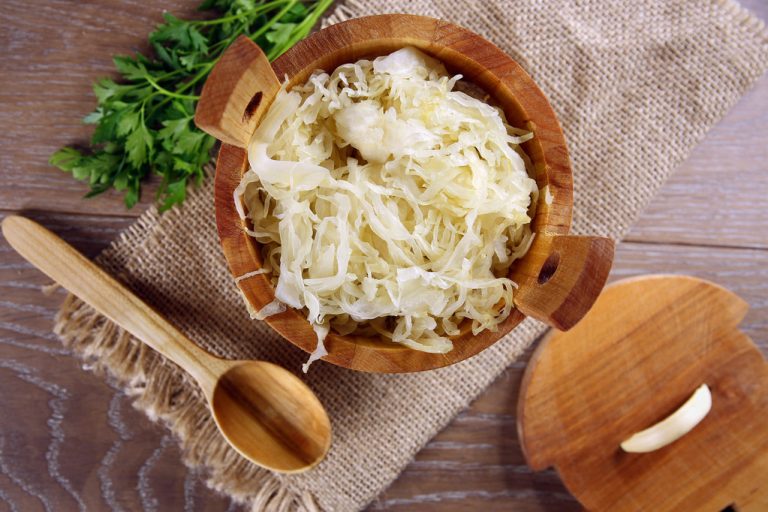Sauerkraut is not only healthy because it contains so many vitamins: it also provides many different minerals. It also promotes a healthy intestinal flora and digestion.
Sauerkraut is made by fermenting white cabbage with lactic acid. During the fermentation process, the sugar in the cabbage is converted into lactic acid by lactic acid bacteria. This gives the cabbage its characteristic sour taste and preserves it. Last but not least, this lactic acid fermentation makes sauerkraut so healthy.

Sauerkraut: These nutritional values make it so healthy
With less than 20 kilocalories and 0.4 grams of fat per 100 grams, sauerkraut is ideal if you want to watch your figure. But there are also plenty of reasons to reach for fermented white cabbage more often. For example, it provides the following vitamins:
Vitamin C: Sauerkraut contains vitamin C, but not in high amounts.
Beta carotene: Sauerkraut is rich in beta carotene, a precursor of vitamin A. It contributes to healthy skin and eyes, supports bone formation and strengthens the immune system.
Vitamin K: Vitamin K is important for healthy bones and blood clotting.
Folic Acid: Folic acid is a B vitamin. The body needs it to form cells and blood.
Vitamin B12: Sauerkraut contains vitamin B12, but only traces of it. Therefore, it is not enough for vegans to reach the recommended daily value.
Sauerkraut contains many minerals, in particular:
Sodium – important for the brain and muscles
Potassium – important for the heart and muscles, as well as cell growth and blood pressure
Magnesium – important for the heart, muscles and bones
Calcium – important for nerves, muscles and hormone balance
In addition, there are also some amino acids and about two to three grams of fiber per 100 grams of sauerkraut.
A healthy intestinal flora with sauerkraut
Even if many people think of indigestion, especially flatulence, when they think of cabbage, sauerkraut is actually very healthy for our digestive system.
On the one hand, sauerkraut is easier to digest than unfermented cabbage because the microorganisms also digest the cellulose during lactic acid fermentation.
Even more important to our gut itself are the lactic acid bacteria: these multiply in abundance during the fermentation process, making sauerkraut an excellent probiotic food. The fermented herb thus contributes to a healthy intestinal flora, which is particularly damaged after antibiotic therapy
By the way: Even if the term “lactic acid” sounds a bit misleading, you don’t need to worry. The lactic acid in sauerkraut is vegan.

Only raw sauerkraut is really healthy
The mildly sour-tasting fermented cabbage is so healthy because it is rich in minerals, vitamins and lactic acid bacteria. It is therefore particularly important that you eat the sauerkraut raw. When it is heated, not only are many vitamins lost, but also the particularly beneficial lactic acid bacteria.
But sauerkraut packaged in cans and jars from the supermarket is almost always pasteurized. Although this still contains lactic acid, the metabolic product of the lactic acid bacteria, it no longer contains living lactic acid bacteria. Such sauerkraut is therefore not probiotically effective and therefore does not contribute to a healthy intestinal flora.
Organic shops and health food stores sometimes sell raw but also often pasteurized sauerkraut. That’s why you should definitely read the packaging or, to be on the safe side, ask in the store whether the sauerkraut is raw, untreated.
But you can also make sauerkraut yourself: All you need is a suitable container, white cabbage and salt – and a few weeks for the fermentation process.

